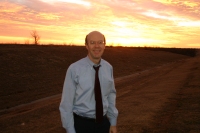

 |

|
|
|
|
Commission Active in State Rural DevelopmentGuest Editorial by Bob AnthonyOklahoma Living - October 4, 2000Oklahoma Corporation Commissioner Bob Anthony submitted the following guest article. Commissioner Anthony has committed his public service to honesty and integrity in office. The FBI recognized Anthony with its highest award "given to a citizen who, at great personal sacrifice, unselfishly served his community and the nation" in helping end a corruption scandal at the Commission. Anthony is a native Oklahoman. In 1922, his Grandfather started the family clothing store business in Oklahoma, and the Commissioner served as President of Anthony’s from 1980 to 1987. At the time Anthony’s was the largest privately-owned company headquartered in Oklahoma with stores in over 200 rural communities and cities around the southwest and nationally. He presently serves as chairman of the Oklahoma Corporation Commission. Oklahoma is great place to live with plenty of land, clean air and clean water. The Oklahoma Corporation Commission is playing an increasingly important role in attracting new economic opportunities to our state while protecting the quality of life in rural Oklahoma. The economic impact of Commission decisions is substantial. Industries it regulates generate more than $10 billion of Oklahoma’s economic activity each year. Technology is changing fast and the Commission is making sure that we are changing to continue to be an effective force in contributing to better rural economic development opportunities. This is evident in the dramatic revisions of public utility regulation. Telecommunication, electricity and natural gas utility industries are undergoing the greatest change since statehood. The tradition of regulated monopolies is being replaced with competitive services and opportunities for more customer choice. As this process moves forward, it is up to the Commission working with the Legislature to ensure that rural Oklahoma receives the maximum benefit and consumers are protected. A few years ago, it was considered a major update to go from a four- or a two-party line to private phone service. Last fall the Commission approved new rules for the state’s largest phone companies. Known as the "Anthony Plan", the rules replace earnings regulation with price caps for individual services and require companies to file a transition plan. Southwestern Bell received approval last fall and Valor, successor to GTE, is expected to apply soon. Internet Access Bringing Economic Opportunity To Rural OklahomaAs a result of incentives included in the Bell transition plan, new telecommunications companies are entering the state. These companies bring jobs ranging from sales and clerical to well-paying technical positions. The program, including Legislative additions, will create one of the best high-speed data transfer systems of any state in the nation. Sales through electronic commerce is one of the fastest growing segments of the economy. Coupling increased Internet connectivity with Oklahoma’s other attributes makes the state increasingly attractive to new business prospects and gives existing companies a broader market. Communities can use video enhanced web pages to recruit new employers. Similar enhanced opportunities are available in research and education and for the state’s fine telemedicine network. You can visit a doctor in Tulsa, from an office in Guymon or Altus. You can attend a four-year college from a front row seat at your computer in Idabel, or Frederick. Now more and more services come to you almost immediately no matter where you live. Oklahoma technology companies are providing high-speed data lines as well. New technologies allow electric utilities and cable television companies to offer this service. It’s not just technology; this spring the Commission completed the separation of Oklahoma Natural Gas Co. services. ONG now joins Arkla and other natural gas utilities as a distribution-only company competitively bidding for gas supply and transmission. This should help reduce prices for consumers and provide better services. Transmission bids are capped at the current cost of service so the competitive process cannot cause rates to increase. Customers will soon be allowed to select the natural gas supplier of their choice and pay their local utility only a distribution fee to deliver that gas to their home or place of business. Similar dramatic changes are occurring in the state’s electric utility industry. Currently restructuring remains before the State Legislature, with the Commission standing by to provide expert technical input when requested. Running parallel to utility regulation in importance is the Commission’s oversight of the state’s oil and gas industry. Many rural residents supplement their farm income with oil and natural gas royalties. The Commission conducts a variety of hearings on a daily basis to ensure all mineral owners participate in the most efficient development of the formation according to their percentage of ownership. The Commission continues to work to streamline its oil and natural gas regulatory process to make Oklahoma more driller-friendly. New wells are often located in rural areas, providing a major industrial load for the local electric co-op, which helps hold down residential rates. Studies show that these drilling dollars have a multiplier effect on local economies, changing hands an average of three times before leaving the community. Additionally, the Commission has responsibility in the setting of some transportation rates and, while having no authority over prices, does inspect gasoline service station pumps to ensure consumers receive the quantity and quality they have purchased. Commission Plays Important Environmental RoleEqually important to its economic development impact is the quality of life role played by the Commission. Field inspectors oversee oil and gas drilling for the protection of public safety and the environment. When problems arise, the Commission works with the industry to plug abandoned wells if the responsible party cannot be found, and supports the efforts of the Oklahoma Energy Resources Board in restoring abandoned sites. Other programs of the Commission include the regulation of above ground and underground petroleum storage tanks. Underground tanks must be properly installed and monitored to protect soil and groundwater. Above ground tanks must be designed to prevent runoff in case of leaks and to lessen the possibility of and damage from an explosion should the tank fail. While the Commission does not regulate farm and ranch tanks, the agency is working with the State Fire Marshal and agricultural groups to provide safety educational information. The Commission’s Transportation Division provides other important safety programs. These include the Pipeline Safety Department, which regulates intrastate oil and natural gas pipelines under its jurisdiction. Recent news articles of pipeline fires and spills in other states and countries show the importance of this function. In addition, the Transportation Division regulates the hauling of hazardous waste and assists the Department of Public Safety by inspecting motor carriers for compliance with safety standards. The Railroad Department investigates complaints on unsafe public railroad/highway crossings due to roughness or lack of sight distance. We are entering exciting times as we create greater competition in regulated public utilities. My goal and that of the Commission is not to micro-manage these efforts, but to ensure that we act as referees to keep the teams playing by the rules. This will allow competition to bring maximum benefits while protecting the quality of life we all cherish as Oklahomans. © 2000 Oklahoma Living
|
|
 |
Honesty. Integrity. ANTHONY.Last updated:
March 07, 2019. |
|